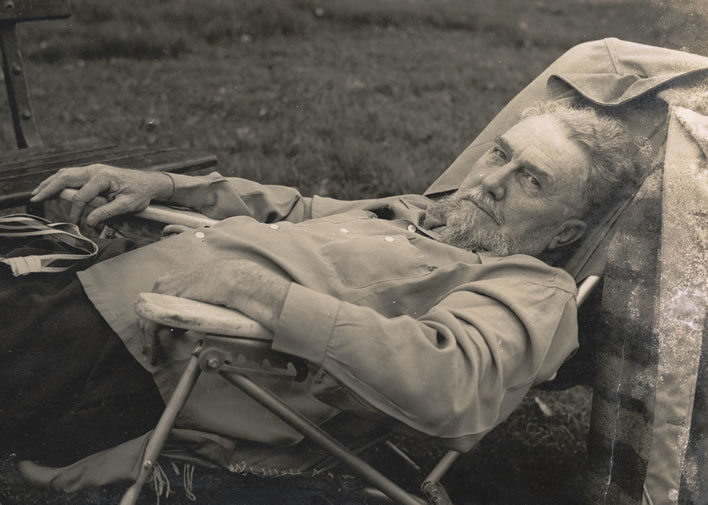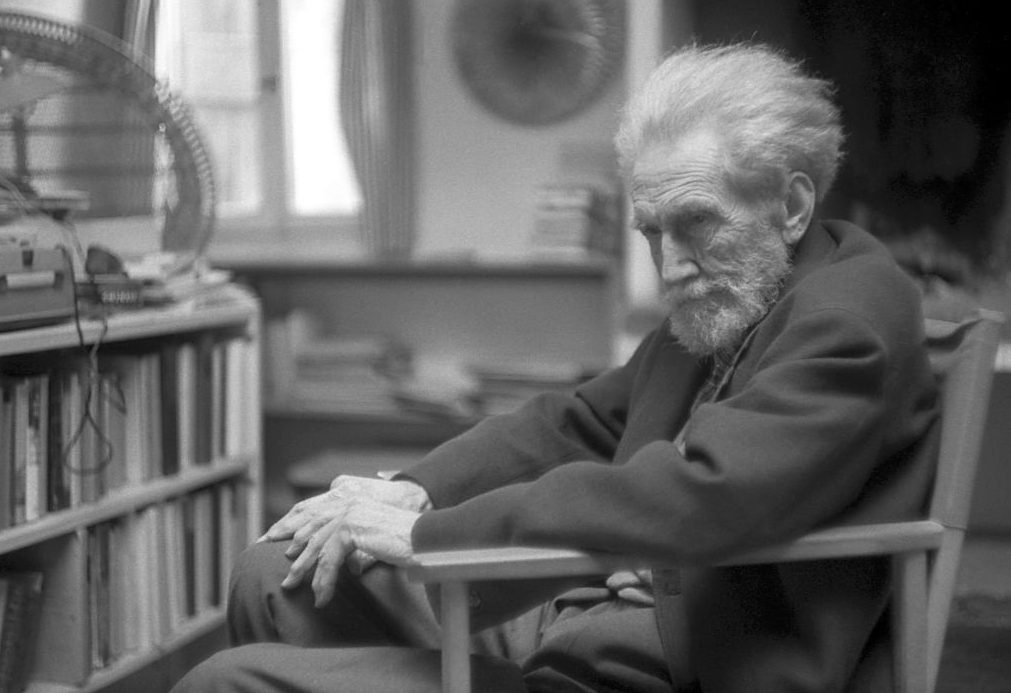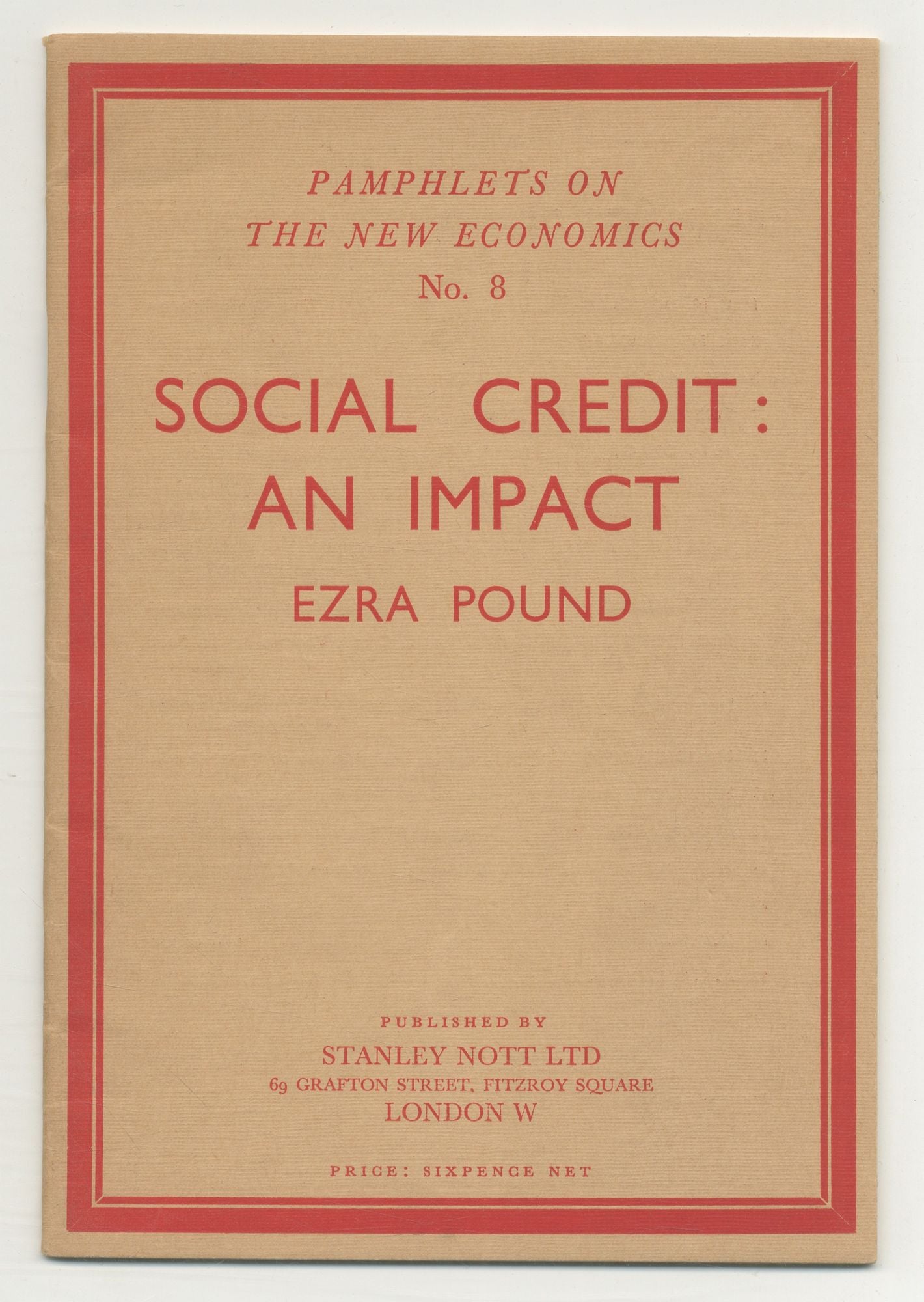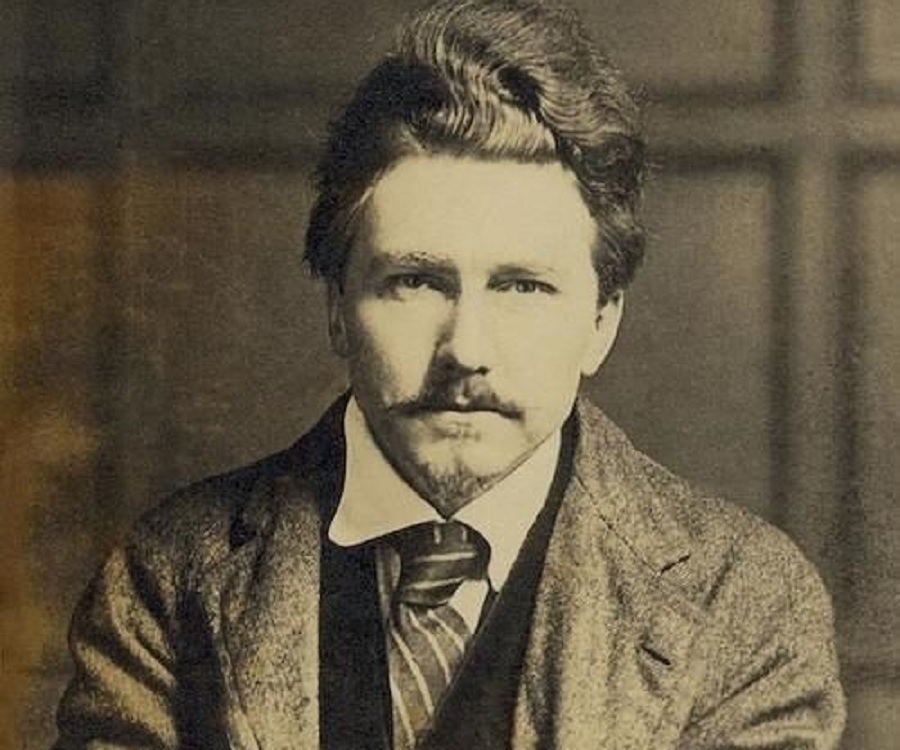Pound In The Bughouse
Posted: Wed Feb 26, 2025 12:53 am
Douglas Mercer
February 25 2025
Ezra Pound was incarcerated at St. Elizabeth’s Psychiatric Hospital from 1945 to 1958 on the political charge of being opposed to Jewish Power. While there he had a stream of visitors, the curious day trippers, the aspiring students, the hangers on of the Beats, the hack and the mid-level poets of the time; but he was also visited by Matt Koehl and George Lincoln Rockwell. While at what he always referred to as the bughouse he set up what came to be called Ezra University. And what the intellectual dilettantes and queasy professors still haven’t totally come around to figuring out, and what makes them fall back on tired and shopworn clichés like poetic madness as they gingerly examine the legend, is that this university had only one item in its curricula: White Power.
While in the madhouse he told Frederick Seidel that only he could save Harvard from its kike sucking President, Nathan Pusey, he told Eustace Mullins to go the Library Of Congress to find out everything he could on the issues of Jewish involvement in the creation of the Federal Reserve and treat the project like a detective story, though he we knew who did it. White Power advocate John Kaspar met with Pound to get slogans for the segregationist Presidential run of John G. Crommelin and suggested the phrases: Separation Of Race Mongrels, and The Kike Behind The Nigger. Pound thought all of those incisive and trenchant.
While locked up Pound took to writing anonymously in small circulation right wing journals. In one of them he wrote under the pseudonym M.V in the New Times that it is perfectly well known that the fuss behind de-segregation in the United States has been started by the Jews and what America needs is White race pride.
Indeed it is well known but oh how it makes the academics rend their garments and gnash their teeth. Why, did not he once stand like a colossus over European culture and implore the artists to Make It New?
But what they forget is that Ezra Pound, poet, was from a family which came to America in 1630, just after the first wave of settlers, so he had Old America in his blood. And he shared with the family of Charles Lindbergh the burning hatred of the Jewish predation in America and its banking and money interests.
In Ezra Pound's poetry, the word usura (Latin for usury) is used as a synecdoche for the institutions of capitalism. It appears frequently in his Cantos, addressing both economic and political issues. Pound uses it to critique the practice of lending money at high interest rates.
With Usura no man has
A house of good stone
With Usura
No man has a dwelling
In those opinion pieces he took to writing he noted that our Victorian forebears would have been scandalized at the idea that one might not be free to study inherited racial characteristics, that some races are retentive only of the inherited bits of their barbaric past. He compares the Communist-Jewish plot to syphilis, and he dismisses the anti-biological nonsense that goes by the name of equality. And he deplores the Jew managed sob stuff in the Jew run agitations against race prejudice.
He made it new alright; as new as tomorrow afternoon.
***
Matt Koehl visited Pound at St. Elizabeth and wrote the following:
The first occasion was on a pleasant spring day in 1953 on the grounds of St. Elizabeth’s hospital in Washington D.C. I was greeted in hearty fashion by the poet, who expressed his special pleasure that I shared his own basic outlook in the controversial matters which had brought him to that dismal institution in the first place. Our discussion touched on a variety of subjects, ranging from economic and social theory and recondite aspects of the Cantos to the strange and stupid behavior of the American government. And the ministrations of Jewish and Black attendants — all of which merely served to enhance the hideous gulag effect. Cheered by my visit, the old gent honored me with a carefully reasoned exposition of Social Credit theory and the principal of usury.
Ezra Pound presented the very image of a sage. The Ezra Pound I knew was cheerfully unrepentant, firm in his beliefs, and staunchly true to those principles he had upheld throughout his life. Never once did he give so much as the slightest hint that he had any regret about anything he had ever done or spoken during the ’30s and ’40s — not excluding his celebrated views on the Jewish Question. In fact, his pointed references to any number of nefarious Jewish practices left no doubt as to where he stood on that particular issue.
***
Pound had a particularly close relationship with John Kaspar and wrote many of his more inflammatory speeches. In a way Kaspar became a microphone for Pound, and his message was segregation or death. Pound continually brought up the issue that it was unscientific to stop studying racial characteristics, and always spoke of the international gang (ie, the Jews) and of FDR as a criminal. He told William Carlos Williams that because his mother was Puerto Rican, he could never understand America the way he (Pound) did, and said he was at best an observant foreigner. For to understand America one had to be White and to have the ancestral heritage in one’s blood.
Pound said that he had once dreamed that when he returned to America after the war it would listen to him and he would become its educator. But that what he returned to was instead a broken parody.
The United States government of course would never have put Ezra Pound on trial, he was too charismatic and too eloquent, and an uninterrupted speech by him without censoring is what they feared.
I think it might be a good thing to hang Roosevelt and a few hundred Jews. This was the political philosophy of the great poet Ezra Pound. And as Koehl said he maintained it throughout his stay at St. Elizabeth. Indeed, he maintained it during the whole course of his life.
When he was released in 1958 he was asked to comment on America. He said that all America was an insane asylum. And he thereupon left his corrupt and destroyed ancestral home for Italy, and when he first set foot on the land he had not been in 13 years he gave a good old Roman Salute.
February 25 2025
Ezra Pound was incarcerated at St. Elizabeth’s Psychiatric Hospital from 1945 to 1958 on the political charge of being opposed to Jewish Power. While there he had a stream of visitors, the curious day trippers, the aspiring students, the hangers on of the Beats, the hack and the mid-level poets of the time; but he was also visited by Matt Koehl and George Lincoln Rockwell. While at what he always referred to as the bughouse he set up what came to be called Ezra University. And what the intellectual dilettantes and queasy professors still haven’t totally come around to figuring out, and what makes them fall back on tired and shopworn clichés like poetic madness as they gingerly examine the legend, is that this university had only one item in its curricula: White Power.
While in the madhouse he told Frederick Seidel that only he could save Harvard from its kike sucking President, Nathan Pusey, he told Eustace Mullins to go the Library Of Congress to find out everything he could on the issues of Jewish involvement in the creation of the Federal Reserve and treat the project like a detective story, though he we knew who did it. White Power advocate John Kaspar met with Pound to get slogans for the segregationist Presidential run of John G. Crommelin and suggested the phrases: Separation Of Race Mongrels, and The Kike Behind The Nigger. Pound thought all of those incisive and trenchant.
While locked up Pound took to writing anonymously in small circulation right wing journals. In one of them he wrote under the pseudonym M.V in the New Times that it is perfectly well known that the fuss behind de-segregation in the United States has been started by the Jews and what America needs is White race pride.
Indeed it is well known but oh how it makes the academics rend their garments and gnash their teeth. Why, did not he once stand like a colossus over European culture and implore the artists to Make It New?
But what they forget is that Ezra Pound, poet, was from a family which came to America in 1630, just after the first wave of settlers, so he had Old America in his blood. And he shared with the family of Charles Lindbergh the burning hatred of the Jewish predation in America and its banking and money interests.
In Ezra Pound's poetry, the word usura (Latin for usury) is used as a synecdoche for the institutions of capitalism. It appears frequently in his Cantos, addressing both economic and political issues. Pound uses it to critique the practice of lending money at high interest rates.
With Usura no man has
A house of good stone
With Usura
No man has a dwelling
In those opinion pieces he took to writing he noted that our Victorian forebears would have been scandalized at the idea that one might not be free to study inherited racial characteristics, that some races are retentive only of the inherited bits of their barbaric past. He compares the Communist-Jewish plot to syphilis, and he dismisses the anti-biological nonsense that goes by the name of equality. And he deplores the Jew managed sob stuff in the Jew run agitations against race prejudice.
He made it new alright; as new as tomorrow afternoon.
***
Matt Koehl visited Pound at St. Elizabeth and wrote the following:
The first occasion was on a pleasant spring day in 1953 on the grounds of St. Elizabeth’s hospital in Washington D.C. I was greeted in hearty fashion by the poet, who expressed his special pleasure that I shared his own basic outlook in the controversial matters which had brought him to that dismal institution in the first place. Our discussion touched on a variety of subjects, ranging from economic and social theory and recondite aspects of the Cantos to the strange and stupid behavior of the American government. And the ministrations of Jewish and Black attendants — all of which merely served to enhance the hideous gulag effect. Cheered by my visit, the old gent honored me with a carefully reasoned exposition of Social Credit theory and the principal of usury.
Ezra Pound presented the very image of a sage. The Ezra Pound I knew was cheerfully unrepentant, firm in his beliefs, and staunchly true to those principles he had upheld throughout his life. Never once did he give so much as the slightest hint that he had any regret about anything he had ever done or spoken during the ’30s and ’40s — not excluding his celebrated views on the Jewish Question. In fact, his pointed references to any number of nefarious Jewish practices left no doubt as to where he stood on that particular issue.
***
Pound had a particularly close relationship with John Kaspar and wrote many of his more inflammatory speeches. In a way Kaspar became a microphone for Pound, and his message was segregation or death. Pound continually brought up the issue that it was unscientific to stop studying racial characteristics, and always spoke of the international gang (ie, the Jews) and of FDR as a criminal. He told William Carlos Williams that because his mother was Puerto Rican, he could never understand America the way he (Pound) did, and said he was at best an observant foreigner. For to understand America one had to be White and to have the ancestral heritage in one’s blood.
Pound said that he had once dreamed that when he returned to America after the war it would listen to him and he would become its educator. But that what he returned to was instead a broken parody.
The United States government of course would never have put Ezra Pound on trial, he was too charismatic and too eloquent, and an uninterrupted speech by him without censoring is what they feared.
I think it might be a good thing to hang Roosevelt and a few hundred Jews. This was the political philosophy of the great poet Ezra Pound. And as Koehl said he maintained it throughout his stay at St. Elizabeth. Indeed, he maintained it during the whole course of his life.
When he was released in 1958 he was asked to comment on America. He said that all America was an insane asylum. And he thereupon left his corrupt and destroyed ancestral home for Italy, and when he first set foot on the land he had not been in 13 years he gave a good old Roman Salute.





